Searched: People
News
The popular series about Jesus is now available in 50 languages with plans for 550 more.
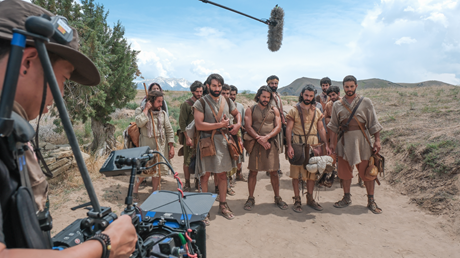 The film was familiar but the language was new for Come and See CEO Stan Jantz.As he sat in a theater in Warsaw, he looked around the room and saw people laughing and crying in the same places he had laughed and cried when he watched The Chosen, the popular streaming series that tells the story of Jesus through the eyes of the disciples. That was the moment of truth for Jantz. The real test for a translation—going beyond accuracy alone—is whether it connects with human hearts.“Translation also has to be beautiful,” Jantz told CT. “It’s an art as much as it is a science.”Come and See has dubbed or subtitled The Chosen into 50 languages so far. The group has plans to do the same for 550 more languages.No TV show has ever been translated into that many languages. Few shows are dubbed more than a handful of times, even in an era where viewership of translated programs has dramatically increased, thanks to streaming services’ global business plans. Netflix can dub shows into about three dozen languages but mostly works in French, German, Polish, Italian, Turkish, Castilian Spanish, Latin American Spanish, and Brazilian Portuguese. Some very popular shows are remade in another language, like Suits, which has Japanese, Korean, and Mongolian versions.Baywatch, starring David Hasselhoff and Pamela Anderson, has been translated 34 times. That was the record, until Come and See started turning out dubbed versions of The Chosen. There’s not a lot of profit in dubbing, so for-profit efforts will only go so far. A nonprofit like Come and See can do more.The group wants to reach 1 billion people with the show, so The Chosen can connect people to Jesus and bring them to faith. Come and ...Continue reading... The film was familiar but the language was new for Come and See CEO Stan Jantz.As he sat in a theater in Warsaw, he looked around the room and saw people laughing and crying in the same places he had laughed and cried when he watched The Chosen, the popular streaming series that tells the story of Jesus through the eyes of the disciples. That was the moment of truth for Jantz. The real test for a translation—going beyond accuracy alone—is whether it connects with human hearts.“Translation also has to be beautiful,” Jantz told CT. “It’s an art as much as it is a science.”Come and See has dubbed or subtitled The Chosen into 50 languages so far. The group has plans to do the same for 550 more languages.No TV show has ever been translated into that many languages. Few shows are dubbed more than a handful of times, even in an era where viewership of translated programs has dramatically increased, thanks to streaming services’ global business plans. Netflix can dub shows into about three dozen languages but mostly works in French, German, Polish, Italian, Turkish, Castilian Spanish, Latin American Spanish, and Brazilian Portuguese. Some very popular shows are remade in another language, like Suits, which has Japanese, Korean, and Mongolian versions.Baywatch, starring David Hasselhoff and Pamela Anderson, has been translated 34 times. That was the record, until Come and See started turning out dubbed versions of The Chosen. There’s not a lot of profit in dubbing, so for-profit efforts will only go so far. A nonprofit like Come and See can do more.The group wants to reach 1 billion people with the show, so The Chosen can connect people to Jesus and bring them to faith. Come and ...Continue reading... |
The popular series about Jesus is now available in 50 languages with plans for 550 more.
 The film was familiar but the language was new for Come and See CEO Stan Jantz.As he sat in a theater in Warsaw, he looked around the room and saw people laughing and crying in the same places he had laughed and cried when he watched The Chosen, the popular streaming series that tells the story of Jesus through the eyes of the disciples. That was the moment of truth for Jantz. The real test for a translation—going beyond accuracy alone—is whether it connects with human hearts.“Translation also has to be beautiful,” Jantz told CT. “It’s an art as much as it is a science.”Come and See has dubbed or subtitled The Chosen into 50 languages so far. The group has plans to do the same for 550 more languages.No TV show has ever been translated into that many languages. Few shows are dubbed more than a handful of times, even in an era where viewership of translated programs has dramatically increased, thanks to streaming services’ global business plans. Netflix can dub shows into about three dozen languages but mostly works in French, German, Polish, Italian, Turkish, Castilian Spanish, Latin American Spanish, and Brazilian Portuguese. Some very popular shows are remade in another language, like Suits, which has Japanese, Korean, and Mongolian versions.Baywatch, starring David Hasselhoff and Pamela Anderson, has been translated 34 times. That was the record, until Come and See started turning out dubbed versions of The Chosen. There’s not a lot of profit in dubbing, so for-profit efforts will only go so far. A nonprofit like Come and See can do more.The group wants to reach 1 billion people with the show, so The Chosen can connect people to Jesus and bring them to faith. Come and ...Continue reading... The film was familiar but the language was new for Come and See CEO Stan Jantz.As he sat in a theater in Warsaw, he looked around the room and saw people laughing and crying in the same places he had laughed and cried when he watched The Chosen, the popular streaming series that tells the story of Jesus through the eyes of the disciples. That was the moment of truth for Jantz. The real test for a translation—going beyond accuracy alone—is whether it connects with human hearts.“Translation also has to be beautiful,” Jantz told CT. “It’s an art as much as it is a science.”Come and See has dubbed or subtitled The Chosen into 50 languages so far. The group has plans to do the same for 550 more languages.No TV show has ever been translated into that many languages. Few shows are dubbed more than a handful of times, even in an era where viewership of translated programs has dramatically increased, thanks to streaming services’ global business plans. Netflix can dub shows into about three dozen languages but mostly works in French, German, Polish, Italian, Turkish, Castilian Spanish, Latin American Spanish, and Brazilian Portuguese. Some very popular shows are remade in another language, like Suits, which has Japanese, Korean, and Mongolian versions.Baywatch, starring David Hasselhoff and Pamela Anderson, has been translated 34 times. That was the record, until Come and See started turning out dubbed versions of The Chosen. There’s not a lot of profit in dubbing, so for-profit efforts will only go so far. A nonprofit like Come and See can do more.The group wants to reach 1 billion people with the show, so The Chosen can connect people to Jesus and bring them to faith. Come and ...Continue reading... |
Jody Hice joined Real America's Voice to discuss his new book, Sacred Trust: Election Integrity and the Will of the People....
|
A first cohort of scholars consider whether God is calling them to executive leadership.
 Ted Song wears many hats.He is the chief innovation and intercultural engagement officer at John Brown University and the head of the engineering department at the evangelical school in Northwest Arkansas. He’s a dad to three daughters, an elder and college minister at his church, and a student earning a law degree to learn more about the rules and regulations governing higher education.Song also has his eye on another potential hat.Last year, he joined the first cohort of presidential fellows at the Council for Christian Colleges and Universities (CCCU), exploring a call to lead an evangelical school.“If presidency is God’s calling, great,” Song said. “If God wants to use a person as a president of a Christian college, great. But that can also happen in the classroom or on an athletic field. I want to remind myself and also remind my students that we always need to go back to our mission.”Song is one of three evangelical academics who have joined the CCCU’s yearlong program to prepare for the possibility of becoming a Christian college president. The other two members of the inaugural group are Keith Hall, vice president for student belonging at Azusa Pacific University, and Sarah Visser, executive vice president for student experience and strategy at Calvin University.“Each one of these fellows is outstanding,” said Shirley Hoogstra, president of the CCCU. “There’s always turnover in senior leadership, and we want to make sure that we are equipping groups of people to be available for those positions … to be ready in the event that a call comes from God to move into the next level of leadership.”The presidential training program launched in ...Continue reading... Ted Song wears many hats.He is the chief innovation and intercultural engagement officer at John Brown University and the head of the engineering department at the evangelical school in Northwest Arkansas. He’s a dad to three daughters, an elder and college minister at his church, and a student earning a law degree to learn more about the rules and regulations governing higher education.Song also has his eye on another potential hat.Last year, he joined the first cohort of presidential fellows at the Council for Christian Colleges and Universities (CCCU), exploring a call to lead an evangelical school.“If presidency is God’s calling, great,” Song said. “If God wants to use a person as a president of a Christian college, great. But that can also happen in the classroom or on an athletic field. I want to remind myself and also remind my students that we always need to go back to our mission.”Song is one of three evangelical academics who have joined the CCCU’s yearlong program to prepare for the possibility of becoming a Christian college president. The other two members of the inaugural group are Keith Hall, vice president for student belonging at Azusa Pacific University, and Sarah Visser, executive vice president for student experience and strategy at Calvin University.“Each one of these fellows is outstanding,” said Shirley Hoogstra, president of the CCCU. “There’s always turnover in senior leadership, and we want to make sure that we are equipping groups of people to be available for those positions … to be ready in the event that a call comes from God to move into the next level of leadership.”The presidential training program launched in ...Continue reading... |
 A Pennsylvania pastor praised God for what he called a "miracle" after an F1 tornado ripped off the roof of his church as about 100 people worshiped inside on Saturday evening, and everyone survived without any significant injuries. A Pennsylvania pastor praised God for what he called a "miracle" after an F1 tornado ripped off the roof of his church as about 100 people worshiped inside on Saturday evening, and everyone survived without any significant injuries. |
It wasn't only because of missionaries from the West, says a Tongan Australian theologian.
 Christian overseas missionaries were more successful in Oceania—the region spanning the Pacific Islands, Australia, Papua New Guinea, and New Zealand—than anywhere else in the world.In particular, people in the Pacific Islands (which include Fiji, Papua New Guinea, Samoa, Vanuatu, Tonga, and more) were receptive to the gospel because “their ancestors’ strong beliefs in a divine presence and in the afterlife made them very open to Christian faith,” wrote Jacqueline Ryle, a contributor to the 2021 reference volume Christianity in Oceania. Tongan Australian theologian Katalina Tahaafe-Williams says her research reveals the same: The growth of Christianity in the region was not because of white Europeans but rather due to Indigenous missionaries who translated Christianity in a way that made sense to locals.Tahaafe-Williams, who lives in Sydney, served as the Indigenous coeditor for the book alongside prominent global Christianity scholars Kenneth R. Ross and Todd M. Johnson.“Our goal was to recruit Indigenous writers from all over the region to contribute to this volume,” she explained. “It was my task to connect with potential authors, theologians, leaders, and church members from the Pacific Islands … we were very committed to finding, however challenging it might be, authors who were part of that particular culture, thereby making the work very authentic.”CT Global books editor Geethanjali Tupps spoke with Tahaafe-Williams on why Christianity flourished in the Pacific Islands, how migration patterns have impacted the church, and why the region shouldn’t serve as the poster child for climate change issues.Continue reading... Christian overseas missionaries were more successful in Oceania—the region spanning the Pacific Islands, Australia, Papua New Guinea, and New Zealand—than anywhere else in the world.In particular, people in the Pacific Islands (which include Fiji, Papua New Guinea, Samoa, Vanuatu, Tonga, and more) were receptive to the gospel because “their ancestors’ strong beliefs in a divine presence and in the afterlife made them very open to Christian faith,” wrote Jacqueline Ryle, a contributor to the 2021 reference volume Christianity in Oceania. Tongan Australian theologian Katalina Tahaafe-Williams says her research reveals the same: The growth of Christianity in the region was not because of white Europeans but rather due to Indigenous missionaries who translated Christianity in a way that made sense to locals.Tahaafe-Williams, who lives in Sydney, served as the Indigenous coeditor for the book alongside prominent global Christianity scholars Kenneth R. Ross and Todd M. Johnson.“Our goal was to recruit Indigenous writers from all over the region to contribute to this volume,” she explained. “It was my task to connect with potential authors, theologians, leaders, and church members from the Pacific Islands … we were very committed to finding, however challenging it might be, authors who were part of that particular culture, thereby making the work very authentic.”CT Global books editor Geethanjali Tupps spoke with Tahaafe-Williams on why Christianity flourished in the Pacific Islands, how migration patterns have impacted the church, and why the region shouldn’t serve as the poster child for climate change issues.Continue reading... |
The popular series about Jesus is now available in 50 languages with plans for 550 more.
 The film was familiar but the language was new for Come and See CEO Stan Jantz.As he sat in a theater in Warsaw, he looked around the room and saw people laughing and crying in the same places he had laughed and cried when he watched The Chosen, the popular streaming series that tells the story of Jesus through the eyes of the disciples. That was the moment of truth for Jantz. The real test for a translation—going beyond accuracy alone—is whether it connects with human hearts.“Translation also has to be beautiful,” Jantz told CT. “It’s an art as much as it is a science.”Come and See has dubbed or subtitled The Chosen into 50 languages so far. The group has plans to do the same for 550 more languages.No TV show has ever been translated into that many languages. Few shows are dubbed more than a handful of times, even in an era where viewership of translated programs has dramatically increased, thanks to streaming services’ global business plans. Netflix can dub shows into about three dozen languages but mostly works in French, German, Polish, Italian, Turkish, Castilian Spanish, Latin American Spanish, and Brazilian Portuguese. Some very popular shows are remade in another language, like Suits, which has Japanese, Korean, and Mongolian versions.Baywatch, starring David Hasselhoff and Pamela Anderson, has been translated 34 times. That was the record, until Come and See started turning out dubbed versions of The Chosen. There’s not a lot of profit in dubbing, so for-profit efforts will only go so far. A nonprofit like Come and See can do more.The group wants to reach 1 billion people with the show, so The Chosen can connect people to Jesus and bring them to faith. Come and ...Continue reading... The film was familiar but the language was new for Come and See CEO Stan Jantz.As he sat in a theater in Warsaw, he looked around the room and saw people laughing and crying in the same places he had laughed and cried when he watched The Chosen, the popular streaming series that tells the story of Jesus through the eyes of the disciples. That was the moment of truth for Jantz. The real test for a translation—going beyond accuracy alone—is whether it connects with human hearts.“Translation also has to be beautiful,” Jantz told CT. “It’s an art as much as it is a science.”Come and See has dubbed or subtitled The Chosen into 50 languages so far. The group has plans to do the same for 550 more languages.No TV show has ever been translated into that many languages. Few shows are dubbed more than a handful of times, even in an era where viewership of translated programs has dramatically increased, thanks to streaming services’ global business plans. Netflix can dub shows into about three dozen languages but mostly works in French, German, Polish, Italian, Turkish, Castilian Spanish, Latin American Spanish, and Brazilian Portuguese. Some very popular shows are remade in another language, like Suits, which has Japanese, Korean, and Mongolian versions.Baywatch, starring David Hasselhoff and Pamela Anderson, has been translated 34 times. That was the record, until Come and See started turning out dubbed versions of The Chosen. There’s not a lot of profit in dubbing, so for-profit efforts will only go so far. A nonprofit like Come and See can do more.The group wants to reach 1 billion people with the show, so The Chosen can connect people to Jesus and bring them to faith. Come and ...Continue reading... |
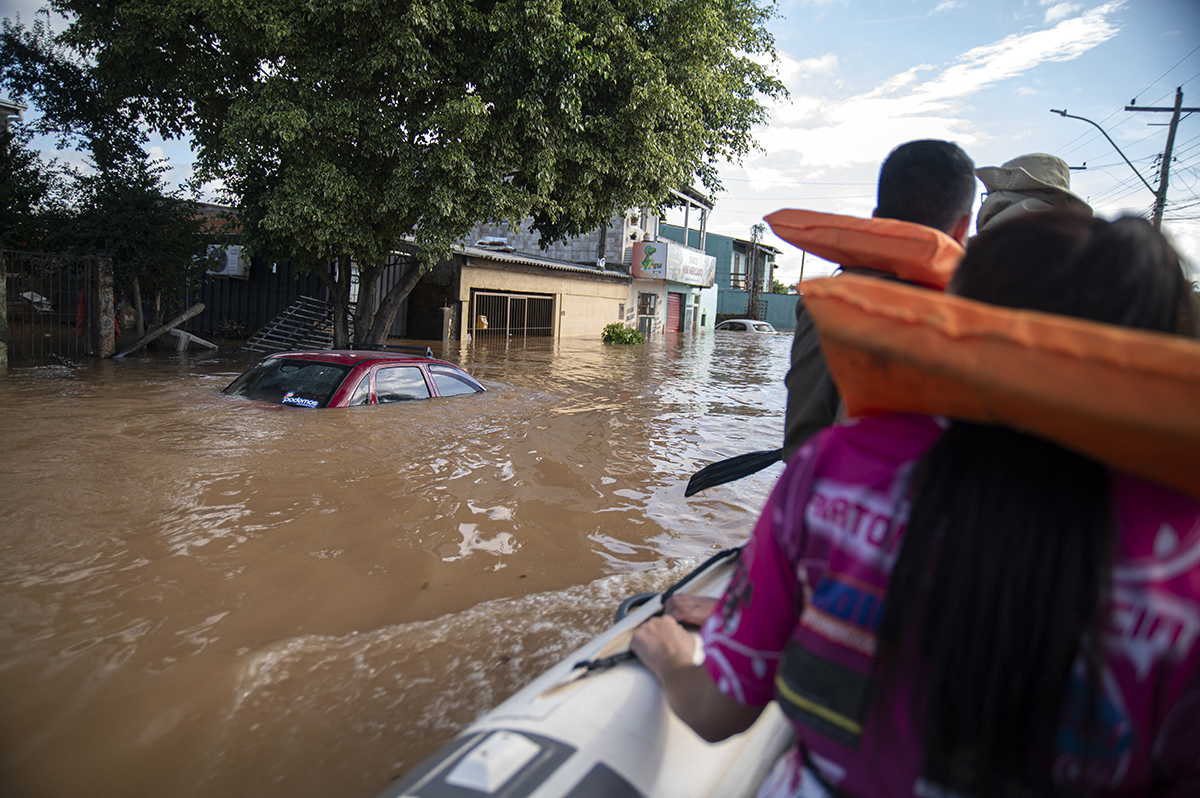 Local churches across southern Brazil have opened their doors to provide shelter and aid to residents in areas of the country that have been devastated by catastrophic floods? that have claimed the lives of at least 136 people and left around 537,000 displaced.? Local churches across southern Brazil have opened their doors to provide shelter and aid to residents in areas of the country that have been devastated by catastrophic floods? that have claimed the lives of at least 136 people and left around 537,000 displaced.? |
A massive crowd of people turned out to greet President Trump Saturday afternoon in Wildwood, New Jersey. the announced attendance […]
|
We're hiring! We need people in a wide variety of positions, but particularly at our attractions during the busy summer season.
|
In the country's most secular state, tiny congregations have made a big impact by their disaster response.
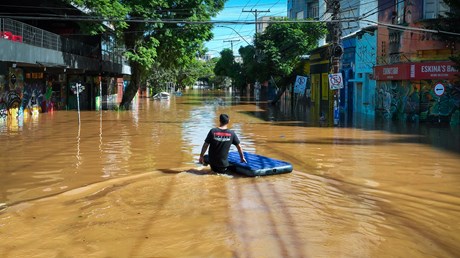 For weeks, Tárik Rodriguez had been working on bringing a guest preacher and worship leader from across the country to help his church celebrate its third anniversary. In 2021, Rodriguez and a small team launched Viela da Graça Igreja in Novo Hamburgo, a small city in Brazil’s most southern province, Rio Grande do Sul.Then, it started raining.The floods have done more than interrupt the small Reformed congregation’s celebratory plans. They’ve devastated the community. The storms that began at the end of April struck Rio Grande do Sul’s most densely populated areas and have killed at least 116 people. Around 130 people are still missing. The high water has closed roads and even the airport, which has grounded flights until May 30. As of Friday, May 10, nearly 400,000 people have been displaced from their homes and 70,772 are in public shelters.Some of those have found their way to Viela da Graça, which is located on higher ground and has been largely protected from a water breach. Since May 4, Rodriguez and members of the 75-person congregation have been hosting around 50 people in a two-bathroom, 3,500-square-foot building.“As Christians, we needed to open our doors,” Rodriguez says. “And that’s what we did.”Beyond the bathroom constraints, the situation has been less than ideal. There are frequent power cuts (1.2 million people have been affected by outages) and the building has lost access to both running and potable water because the sanitation company cannot treat the dirty floodwaters. A nearby residential condominium, which gets its water from a well, has provided drinking water and showers.Continue reading... For weeks, Tárik Rodriguez had been working on bringing a guest preacher and worship leader from across the country to help his church celebrate its third anniversary. In 2021, Rodriguez and a small team launched Viela da Graça Igreja in Novo Hamburgo, a small city in Brazil’s most southern province, Rio Grande do Sul.Then, it started raining.The floods have done more than interrupt the small Reformed congregation’s celebratory plans. They’ve devastated the community. The storms that began at the end of April struck Rio Grande do Sul’s most densely populated areas and have killed at least 116 people. Around 130 people are still missing. The high water has closed roads and even the airport, which has grounded flights until May 30. As of Friday, May 10, nearly 400,000 people have been displaced from their homes and 70,772 are in public shelters.Some of those have found their way to Viela da Graça, which is located on higher ground and has been largely protected from a water breach. Since May 4, Rodriguez and members of the 75-person congregation have been hosting around 50 people in a two-bathroom, 3,500-square-foot building.“As Christians, we needed to open our doors,” Rodriguez says. “And that’s what we did.”Beyond the bathroom constraints, the situation has been less than ideal. There are frequent power cuts (1.2 million people have been affected by outages) and the building has lost access to both running and potable water because the sanitation company cannot treat the dirty floodwaters. A nearby residential condominium, which gets its water from a well, has provided drinking water and showers.Continue reading... |
One of the founding leaders of Victory megachurch, he never stopped running to share the gospel.
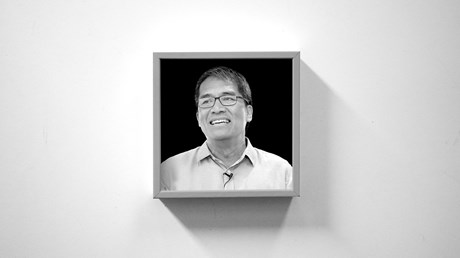 Ferdinand “Ferdie” Cabiling, a bishop at one of the Philippines’ largest megachurches who ran across the Philippines to raise money for disadvantaged students, died April 1, the day after Easter. He was 58 years old.Dubbed “the Running Pastor,” the moniker describes not only Cabiling’s epic race but how he lived his life and served as an evangelist. For 38 years, he was a vocational minister of Victory Christian Fellowship of the Philippines, which has nearly 150 locations in the country. The branch he led, Victory Metro Manila, averaged more than 75,000 people each Sunday. [Note: The author is a member of Victory Church and was a part of the late pastor's small group in 2014.]In the past two years, his focus was on teaching evangelism to Victory leaders. Every time he received a teaching invitation, his answer was always yes, said his assistant, Faye Bonifacio.“He was a maximizer,” Bonifacio said, noting that Cabiling developed a habit of taking short naps while parked at a gas station between long drives. “Because he liked to drive, he did a lot in a day.”Hours before his death, Cabiling had visited a church member at a hospital an hour away from his hometown of Cuyapo before parking his car at a gas station, likely for a break before heading to his next destination. It was there that an attendant found his lifeless body and rushed him to the hospital he had just visited. Cabiling had died of a heart attack.“He was a serious man of passion, action, and conviction,” wrote Steve Murrell, the founding pastor of Victory, the flagship church for the charismatic-leaning Every Nation Churches and Ministries, which has churches and campus ministries in ...Continue reading... Ferdinand “Ferdie” Cabiling, a bishop at one of the Philippines’ largest megachurches who ran across the Philippines to raise money for disadvantaged students, died April 1, the day after Easter. He was 58 years old.Dubbed “the Running Pastor,” the moniker describes not only Cabiling’s epic race but how he lived his life and served as an evangelist. For 38 years, he was a vocational minister of Victory Christian Fellowship of the Philippines, which has nearly 150 locations in the country. The branch he led, Victory Metro Manila, averaged more than 75,000 people each Sunday. [Note: The author is a member of Victory Church and was a part of the late pastor's small group in 2014.]In the past two years, his focus was on teaching evangelism to Victory leaders. Every time he received a teaching invitation, his answer was always yes, said his assistant, Faye Bonifacio.“He was a maximizer,” Bonifacio said, noting that Cabiling developed a habit of taking short naps while parked at a gas station between long drives. “Because he liked to drive, he did a lot in a day.”Hours before his death, Cabiling had visited a church member at a hospital an hour away from his hometown of Cuyapo before parking his car at a gas station, likely for a break before heading to his next destination. It was there that an attendant found his lifeless body and rushed him to the hospital he had just visited. Cabiling had died of a heart attack.“He was a serious man of passion, action, and conviction,” wrote Steve Murrell, the founding pastor of Victory, the flagship church for the charismatic-leaning Every Nation Churches and Ministries, which has churches and campus ministries in ...Continue reading... |
The champion of “native missions” trained more than 100,000 evangelists but got in trouble for financial mismanagement.
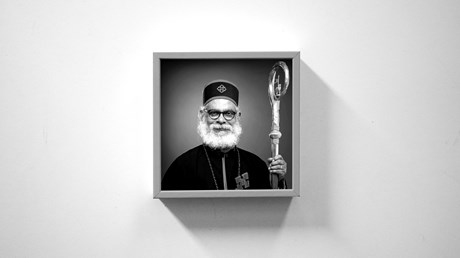 Athanasius Yohannan, who built one of the world’s largest mission organizations on the idea that Western Christians should support “native missionaries” but got in trouble for financial irregularities and dishonest fundraising, died on May 8. He was 74 and got hit by a car while walking along the road near his ministry headquarters in Texas.Born Kadapilaril Punnoose Yohannan and known for most of his ministry as K. P., Yohannan founded Gospel for Asia in 1979. Over the next 45 years, the organization trained more than 100,000 people to preach the gospel and plant and pastor churches in India, Bangladesh, Nepal, Sri Lanka, and other places in Southeast Asia, according to a recent ministry report. Gospel for Asia raised as much as $93 million in a year and in 2005 reported it was supporting about 14,500 indigenous evangelists and pastors in same-culture and near-culture ministry. Christians in the US were asked to give $30 per month to support them.“If we evangelize the world’s lost billions … it will be through native missions,” Yohannan wrote for CT. “The native missionary is far more effective than the expatriate. The national already knows the language and is already part of the culture. In many instances, he or she can go places where outsiders cannot go.”Yohannan’s death was mourned by Gospel for Asia, the church that he started and served as metropolitan bishop, and prominent political leaders in India.“He will be remembered for his service to society and emphasis on improving the quality of life of the downtrodden,” Prime Minister Narendra Modi wrote on social media. “May his soul rest in peace.”Both the governor of Kerala and the ...Continue reading... Athanasius Yohannan, who built one of the world’s largest mission organizations on the idea that Western Christians should support “native missionaries” but got in trouble for financial irregularities and dishonest fundraising, died on May 8. He was 74 and got hit by a car while walking along the road near his ministry headquarters in Texas.Born Kadapilaril Punnoose Yohannan and known for most of his ministry as K. P., Yohannan founded Gospel for Asia in 1979. Over the next 45 years, the organization trained more than 100,000 people to preach the gospel and plant and pastor churches in India, Bangladesh, Nepal, Sri Lanka, and other places in Southeast Asia, according to a recent ministry report. Gospel for Asia raised as much as $93 million in a year and in 2005 reported it was supporting about 14,500 indigenous evangelists and pastors in same-culture and near-culture ministry. Christians in the US were asked to give $30 per month to support them.“If we evangelize the world’s lost billions … it will be through native missions,” Yohannan wrote for CT. “The native missionary is far more effective than the expatriate. The national already knows the language and is already part of the culture. In many instances, he or she can go places where outsiders cannot go.”Yohannan’s death was mourned by Gospel for Asia, the church that he started and served as metropolitan bishop, and prominent political leaders in India.“He will be remembered for his service to society and emphasis on improving the quality of life of the downtrodden,” Prime Minister Narendra Modi wrote on social media. “May his soul rest in peace.”Both the governor of Kerala and the ...Continue reading... |
In the country's most secular state, tiny congregations have made a big impact by their disaster response.
 For weeks, Tárik Rodriguez had been working on bringing a guest preacher and worship leader from across the country to help his church celebrate its third anniversary. In 2021, Rodriguez and a small team launched Viela da Graça Igreja in Novo Hamburgo, a small city in Brazil’s most southern province, Rio Grande do Sul.Then, it started raining.The floods have done more than interrupt the small Reformed congregation’s celebratory plans. They’ve devastated the community. The storms that began at the end of April struck Rio Grande do Sul’s most densely populated areas and have killed at least 116 people. Around 130 people are still missing. The high water has closed roads and even the airport, which has grounded flights until May 30. As of Friday, May 10, nearly 400,000 people have been displaced from their homes and 70,772 are in public shelters.Some of those have found their way to Viela da Graça, which is located on higher ground and has been largely protected from a water breach. Since May 4, Rodriguez and members of the 75-person congregation have been hosting around 50 people in a two-bathroom, 3,500-square-foot building.“As Christians, we needed to open our doors,” Rodriguez says. “And that’s what we did.”Beyond the bathroom constraints, the situation has been less than ideal. There are frequent power cuts (1.2 million people have been affected by outages) and the building has lost access to both running and potable water because the sanitation company cannot treat the dirty floodwaters. A nearby residential condominium, which gets its water from a well, has provided drinking water and showers.Continue reading... For weeks, Tárik Rodriguez had been working on bringing a guest preacher and worship leader from across the country to help his church celebrate its third anniversary. In 2021, Rodriguez and a small team launched Viela da Graça Igreja in Novo Hamburgo, a small city in Brazil’s most southern province, Rio Grande do Sul.Then, it started raining.The floods have done more than interrupt the small Reformed congregation’s celebratory plans. They’ve devastated the community. The storms that began at the end of April struck Rio Grande do Sul’s most densely populated areas and have killed at least 116 people. Around 130 people are still missing. The high water has closed roads and even the airport, which has grounded flights until May 30. As of Friday, May 10, nearly 400,000 people have been displaced from their homes and 70,772 are in public shelters.Some of those have found their way to Viela da Graça, which is located on higher ground and has been largely protected from a water breach. Since May 4, Rodriguez and members of the 75-person congregation have been hosting around 50 people in a two-bathroom, 3,500-square-foot building.“As Christians, we needed to open our doors,” Rodriguez says. “And that’s what we did.”Beyond the bathroom constraints, the situation has been less than ideal. There are frequent power cuts (1.2 million people have been affected by outages) and the building has lost access to both running and potable water because the sanitation company cannot treat the dirty floodwaters. A nearby residential condominium, which gets its water from a well, has provided drinking water and showers.Continue reading... |
The controversial iPad ad proves that technology can indeed flatten—or crush—what is real.
 A recent advertisement from Apple for the new iPad Pro has somehow managed to existentially disturb me. Titled “Crush!” it shows an ominous hydraulic press above a platform filled with symbols of humanity, creativity, and joy: a metronome, guitar, classical statue, piano, analog cameras, books, paint, and more.The metronome starts, and the press descends to Sonny & Cher’s “All I Need Is You,” slowly obliterating everything in high-def slow motion, before rising again to reveal only a “thinner than ever” iPad Pro. “Just imagine all the things it’ll be used to create,” Apple CEO Tim Cook posted on the social platform X.I am not alone in my revulsion. Actors Hugh Grant and Justine Bateman join me, as do apparently thousands of vocal people on the Internet and what appears to be the entire nation of Japan. The backlash, particularly from the “creatives” that Apple was courting for their product, was so pronounced that the company issued a rare apology, saying they had “missed the mark.”But what mark did they miss? More than missing just the tastes of their buyers, they missed the mark of reality—both of the creative process and of the goodness of the embodied nature that is essential to our humanity.I see why Apple produced the ad. There is tremendous economic incentive for tech corporations to replace previous, more embodied experiences and tools. Apple Music will never scratch like the fragile grooves of a vinyl record (also, it contains most of the recorded music in the world). GarageBand can’t go out of tune (and its digital “instruments” can mimic the entire orchestra). One can “paint” all day on ...Continue reading... A recent advertisement from Apple for the new iPad Pro has somehow managed to existentially disturb me. Titled “Crush!” it shows an ominous hydraulic press above a platform filled with symbols of humanity, creativity, and joy: a metronome, guitar, classical statue, piano, analog cameras, books, paint, and more.The metronome starts, and the press descends to Sonny & Cher’s “All I Need Is You,” slowly obliterating everything in high-def slow motion, before rising again to reveal only a “thinner than ever” iPad Pro. “Just imagine all the things it’ll be used to create,” Apple CEO Tim Cook posted on the social platform X.I am not alone in my revulsion. Actors Hugh Grant and Justine Bateman join me, as do apparently thousands of vocal people on the Internet and what appears to be the entire nation of Japan. The backlash, particularly from the “creatives” that Apple was courting for their product, was so pronounced that the company issued a rare apology, saying they had “missed the mark.”But what mark did they miss? More than missing just the tastes of their buyers, they missed the mark of reality—both of the creative process and of the goodness of the embodied nature that is essential to our humanity.I see why Apple produced the ad. There is tremendous economic incentive for tech corporations to replace previous, more embodied experiences and tools. Apple Music will never scratch like the fragile grooves of a vinyl record (also, it contains most of the recorded music in the world). GarageBand can’t go out of tune (and its digital “instruments” can mimic the entire orchestra). One can “paint” all day on ...Continue reading... |
Drake and Kendrick Lamar's rivalry reveals our craving for controversy—and what's lost when community is based on shared hatred, not love.
 This piece was adapted from Russell Moore’s newsletter. Subscribe here.Not since Tupac died have we seen the country quite as fixated on a feud between rappers. Over the past several weeks, artists Drake and Kendrick Lamar kept the news cycle abuzz with their dueling diss tracks—ridiculing each other in trivial matters of height and weight and popularity before getting nastier with implications of secret love children and the possible grooming of minors.As the lyrics amped up, police even investigated whether the argument was related to a shooting of a security guard outside Drake’s home in Toronto. For most people, though, the feud didn’t seem dangerous; it just seemed fun. And that’s what worries me.I am far from qualified to judge who the better artist is between Drake and Lamar. My dogs were named Waylon and Willie, but, come to think of it, the Outlaws wrote a diss track or two themselves. Even so, if this were just a story about musicians’ egos battling, it could be quickly forgotten. The greater concern is not that these two artists have diss tracks, but that we are all living in one ourselves.Drake and Lamar obviously do have some genuine dislike of each other. I share sarcastic barbs with a good friend sometimes, but I’ve never accused him of being a pedophile or of neglecting his child support. And yet, it also seems that much of this feud is theatrical—meant to mutually benefit them both.After all, the question in the music industry press right now is not whether restraining orders will be sought but whose tracks are beating whose on the charts. The truth is, no matter who is “winning” or “losing” in that competition, both are winning. People ...Continue reading... This piece was adapted from Russell Moore’s newsletter. Subscribe here.Not since Tupac died have we seen the country quite as fixated on a feud between rappers. Over the past several weeks, artists Drake and Kendrick Lamar kept the news cycle abuzz with their dueling diss tracks—ridiculing each other in trivial matters of height and weight and popularity before getting nastier with implications of secret love children and the possible grooming of minors.As the lyrics amped up, police even investigated whether the argument was related to a shooting of a security guard outside Drake’s home in Toronto. For most people, though, the feud didn’t seem dangerous; it just seemed fun. And that’s what worries me.I am far from qualified to judge who the better artist is between Drake and Lamar. My dogs were named Waylon and Willie, but, come to think of it, the Outlaws wrote a diss track or two themselves. Even so, if this were just a story about musicians’ egos battling, it could be quickly forgotten. The greater concern is not that these two artists have diss tracks, but that we are all living in one ourselves.Drake and Lamar obviously do have some genuine dislike of each other. I share sarcastic barbs with a good friend sometimes, but I’ve never accused him of being a pedophile or of neglecting his child support. And yet, it also seems that much of this feud is theatrical—meant to mutually benefit them both.After all, the question in the music industry press right now is not whether restraining orders will be sought but whose tracks are beating whose on the charts. The truth is, no matter who is “winning” or “losing” in that competition, both are winning. People ...Continue reading... |
The champion of “native missions” trained more than 100,000 evangelists but got in trouble for financial mismanagement.
 Athanasius Yohannan, who built one of the world’s largest mission organizations on the idea that Western Christians should support “native missionaries” but got in trouble for financial irregularities and dishonest fundraising, died on May 8. He was 74 and got hit by a car while walking along the road near his ministry headquarters in Texas.Born Kadapilaril Punnoose Yohannan and known for most of his ministry as K. P., Yohannan founded Gospel for Asia in 1979. Over the next 45 years, the organization trained more than 100,000 people to preach the gospel and plant and pastor churches in India, Bangladesh, Nepal, Sri Lanka, and other places in Southeast Asia, according to a recent ministry report. Gospel for Asia raised as much as $93 million in a year and in 2005 reported it was supporting about 14,500 indigenous evangelists and pastors in same-culture and near-culture ministry. Christians in the US were asked to give $30 per month to support them.“If we evangelize the world’s lost billions … it will be through native missions,” Yohannan wrote for CT. “The native missionary is far more effective than the expatriate. The national already knows the language and is already part of the culture. In many instances, he or she can go places where outsiders cannot go.”Yohannan’s death was mourned by Gospel for Asia, the church that he started and served as metropolitan bishop, and prominent political leaders in India.“He will be remembered for his service to society and emphasis on improving the quality of life of the downtrodden,” Prime Minister Narendra Modi wrote on social media. “May his soul rest in peace.”Both the governor of Kerala and the ...Continue reading... Athanasius Yohannan, who built one of the world’s largest mission organizations on the idea that Western Christians should support “native missionaries” but got in trouble for financial irregularities and dishonest fundraising, died on May 8. He was 74 and got hit by a car while walking along the road near his ministry headquarters in Texas.Born Kadapilaril Punnoose Yohannan and known for most of his ministry as K. P., Yohannan founded Gospel for Asia in 1979. Over the next 45 years, the organization trained more than 100,000 people to preach the gospel and plant and pastor churches in India, Bangladesh, Nepal, Sri Lanka, and other places in Southeast Asia, according to a recent ministry report. Gospel for Asia raised as much as $93 million in a year and in 2005 reported it was supporting about 14,500 indigenous evangelists and pastors in same-culture and near-culture ministry. Christians in the US were asked to give $30 per month to support them.“If we evangelize the world’s lost billions … it will be through native missions,” Yohannan wrote for CT. “The native missionary is far more effective than the expatriate. The national already knows the language and is already part of the culture. In many instances, he or she can go places where outsiders cannot go.”Yohannan’s death was mourned by Gospel for Asia, the church that he started and served as metropolitan bishop, and prominent political leaders in India.“He will be remembered for his service to society and emphasis on improving the quality of life of the downtrodden,” Prime Minister Narendra Modi wrote on social media. “May his soul rest in peace.”Both the governor of Kerala and the ...Continue reading... |
Long-shot campaign needs 15,000 signatures for the chance to get on the ballot.
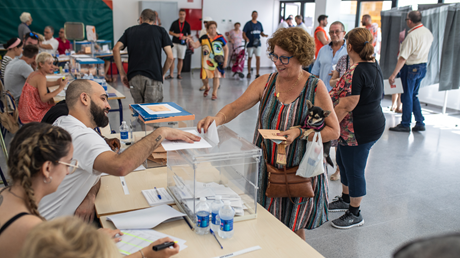 Eye-catching election placards are popping up across the European Union. They appear overnight in public squares and in front of train stations, along the Autobahn and the Champs-Élysées and many lesser-known rues, strassen, and calles.With bright colors and bold slogans, each promises to make a difference in the European Parliament, if only passersby will vote for their party in the upcoming election.“Make Europe strong,” says one.“Make it happen,” urges another.And there’s a new slogan for a new party in Spain: “United in values, guided by faith.”The sign asks people to vote for Fe, Infancia, Educación, y Libertad (Faith, Childhood, Education, and Liberty) or FIEL, a new, explicitly evangelical Christian party. The party’s candidate for the European Parliament may not actually appear on ballots in June, though. Before Juan José Cortés can stand for election, FIEL needs 15,000 signatures by May 12.“We are at a crucial moment,” party president Salvador Martí wrote in a recent campaign letter. “Your signature is essential so that we can continue in the battle, and so that together we can work for a better future for all.”Martí acknowledges this is an uphill battle. Many experts say it’s basically impossible to build a new party from scratch out of a tiny religious minority. Evangelicals make up about 2 percent of the Spanish population. There are fewer than 5,000 evangelical congregations in the whole country, even with the recent increase in evangelical immigrants.“We do not want to settle for the obstacles that say that it is not possible to build a party built by citizens like you and me ...Continue reading... Eye-catching election placards are popping up across the European Union. They appear overnight in public squares and in front of train stations, along the Autobahn and the Champs-Élysées and many lesser-known rues, strassen, and calles.With bright colors and bold slogans, each promises to make a difference in the European Parliament, if only passersby will vote for their party in the upcoming election.“Make Europe strong,” says one.“Make it happen,” urges another.And there’s a new slogan for a new party in Spain: “United in values, guided by faith.”The sign asks people to vote for Fe, Infancia, Educación, y Libertad (Faith, Childhood, Education, and Liberty) or FIEL, a new, explicitly evangelical Christian party. The party’s candidate for the European Parliament may not actually appear on ballots in June, though. Before Juan José Cortés can stand for election, FIEL needs 15,000 signatures by May 12.“We are at a crucial moment,” party president Salvador Martí wrote in a recent campaign letter. “Your signature is essential so that we can continue in the battle, and so that together we can work for a better future for all.”Martí acknowledges this is an uphill battle. Many experts say it’s basically impossible to build a new party from scratch out of a tiny religious minority. Evangelicals make up about 2 percent of the Spanish population. There are fewer than 5,000 evangelical congregations in the whole country, even with the recent increase in evangelical immigrants.“We do not want to settle for the obstacles that say that it is not possible to build a party built by citizens like you and me ...Continue reading... |
Long-shot campaign needs 15,000 signatures for the chance to get on the ballot.
 Eye-catching election placards are popping up across the European Union. They appear overnight in public squares and in front of train stations, along the Autobahn and the Champs-Élysées and many lesser-known rues, strassen, and calles.With bright colors and bold slogans, each promises to make a difference in the European Parliament, if only passersby will vote for their party in the upcoming election.“Make Europe strong,” says one.“Make it happen,” urges another.And there’s a new slogan for a new party in Spain: “United in values, guided by faith.”The sign asks people to vote for Fe, Infancia, Educación, y Libertad (Faith, Childhood, Education, and Liberty) or FIEL, a new, explicitly evangelical Christian party. The party’s candidate for the European Parliament may not actually appear on ballots in June, though. Before Juan José Cortés can stand for election, FIEL needs 15,000 signatures by May 12.“We are at a crucial moment,” party president Salvador Martí wrote in a recent campaign letter. “Your signature is essential so that we can continue in the battle, and so that together we can work for a better future for all.”Martí acknowledges this is an uphill battle. Many experts say it’s basically impossible to build a new party from scratch out of a tiny religious minority. Evangelicals make up about 2 percent of the Spanish population. There are fewer than 5,000 evangelical congregations in the whole country, even with the recent increase in evangelical immigrants.“We do not want to settle for the obstacles that say that it is not possible to build a party built by citizens like you and me ...Continue reading... Eye-catching election placards are popping up across the European Union. They appear overnight in public squares and in front of train stations, along the Autobahn and the Champs-Élysées and many lesser-known rues, strassen, and calles.With bright colors and bold slogans, each promises to make a difference in the European Parliament, if only passersby will vote for their party in the upcoming election.“Make Europe strong,” says one.“Make it happen,” urges another.And there’s a new slogan for a new party in Spain: “United in values, guided by faith.”The sign asks people to vote for Fe, Infancia, Educación, y Libertad (Faith, Childhood, Education, and Liberty) or FIEL, a new, explicitly evangelical Christian party. The party’s candidate for the European Parliament may not actually appear on ballots in June, though. Before Juan José Cortés can stand for election, FIEL needs 15,000 signatures by May 12.“We are at a crucial moment,” party president Salvador Martí wrote in a recent campaign letter. “Your signature is essential so that we can continue in the battle, and so that together we can work for a better future for all.”Martí acknowledges this is an uphill battle. Many experts say it’s basically impossible to build a new party from scratch out of a tiny religious minority. Evangelicals make up about 2 percent of the Spanish population. There are fewer than 5,000 evangelical congregations in the whole country, even with the recent increase in evangelical immigrants.“We do not want to settle for the obstacles that say that it is not possible to build a party built by citizens like you and me ...Continue reading... |
We're hiring! We need people in a wide variety of positions, but particularly at our attractions during the busy summer season.
|
We're hiring! We need people in a wide variety of positions, but particularly at our attractions during the busy summer season.
|
More than 34,000 young people made professions of faith during this year's Winter Jam Christian concert tour, underscoring what the tour's pastor says is Generation Z's deep hunger for authenticity and truth.
|
Migrant rights have been off-radar for many Panamanian Christians. But as pressures increase, some are speaking out ahead of this weekend's general elections.
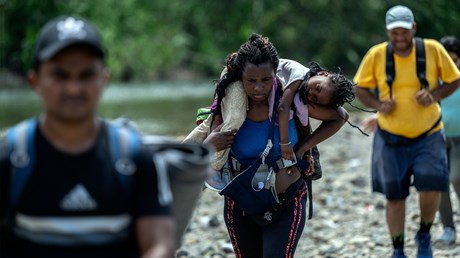 Update (May 6, 2024): José Raúl Mulino will be Panama’s new president after the Realizando Metas (Realizing Goals) party candidate won 34.2 percent of the vote.Mulino began the campaign as the running mate of former president Ricardo Martinelli. (Martinelli previously served from 2009 to 2014.) When Martinelli was booted from the ticket after receiving a 10-year prison sentence for money laundering, Mulino assumed the top of the ticket. While other candidates fought to get him removed from the ballot for bypassing the party’s selection process, the country’s supreme court declared it legal two days prior to the election.Last month, Mulino promised to close the Darién Gap, where tens of thousands of migrants have crossed from Colombia to Panama on their journey to the US border. On Monday, the president-elect reiterated his desire to do so, saying that he will work with the governments of Colombia and the United States to jointly create a long-term solution.“Currently we have technology to survey the border, and I hope to start a repatriation process as early as possible,” he said in an interview Monday with Radio Blu.Mulino is set to be inaugurated on July 1.----On May 5, Panamanians will vote for a new president. The outcome of this election may have consequences for far more than its 4.4 million residents; it could change the migration reality for the hundreds of thousands of people traveling from South America, Asia, and Africa who pass through the Central American country en route to the United States.Leading in the polls is José Raúl Mulino, a candidate for Realizando Metas (Realizing Goals), a right-wing populist party founded by disgraced president Ricardo ...Continue reading... Update (May 6, 2024): José Raúl Mulino will be Panama’s new president after the Realizando Metas (Realizing Goals) party candidate won 34.2 percent of the vote.Mulino began the campaign as the running mate of former president Ricardo Martinelli. (Martinelli previously served from 2009 to 2014.) When Martinelli was booted from the ticket after receiving a 10-year prison sentence for money laundering, Mulino assumed the top of the ticket. While other candidates fought to get him removed from the ballot for bypassing the party’s selection process, the country’s supreme court declared it legal two days prior to the election.Last month, Mulino promised to close the Darién Gap, where tens of thousands of migrants have crossed from Colombia to Panama on their journey to the US border. On Monday, the president-elect reiterated his desire to do so, saying that he will work with the governments of Colombia and the United States to jointly create a long-term solution.“Currently we have technology to survey the border, and I hope to start a repatriation process as early as possible,” he said in an interview Monday with Radio Blu.Mulino is set to be inaugurated on July 1.----On May 5, Panamanians will vote for a new president. The outcome of this election may have consequences for far more than its 4.4 million residents; it could change the migration reality for the hundreds of thousands of people traveling from South America, Asia, and Africa who pass through the Central American country en route to the United States.Leading in the polls is José Raúl Mulino, a candidate for Realizando Metas (Realizing Goals), a right-wing populist party founded by disgraced president Ricardo ...Continue reading... |
A Honduran church leads the way in local garbage collection while praying for an international plastics treaty.
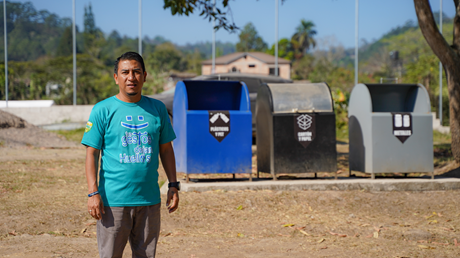 A banner hangs outside the Church of God in the village of El Rincón, Honduras, that says, “Let’s be part of the solution, not the pollution.”It’s a message pastor Wilfredo Vásquez posted after witnessing the harmful effects of plastics in his community.“More and more, I understand that if we want to see changes in any area of society, we as children of God must take the initiative for those changes, because the church is the hope of the world,” he told CT.Vásquez, who shepherds the Wesleyan-Arminian congregation in the Central American town of about 4,000 people, has started taking steps to help his community and hopes world leaders will do the same by establishing an international treaty on plastics.From April 23 to 29, delegates from around the world met in Ottawa for the United Nations’ Intergovernmental Negotiating Committee on Plastic Pollution (INC-4). It’s the fourth stage in a five-stage process working toward an agreement that has the potential to change how plastic is handled globally.If passed, experts believe it could have a similar impact on plastic usage as the Montreal Protocol of 1987 had on chemicals such as freon.While the final stage of the process isn’t until November in South Korea, after the most recent round of discussions in Canada, delegates from more than 150 countries agreed to begin intercessional work. Right away, delegates will start meeting to develop ways to identify plastic products and chemicals of concern.In El Rincón, 3,600 miles away from the latest round of discussions, Vásquez is praying for the treaty’s passage.Vásquez knows exactly what’s at stake and what a difference even ...Continue reading... A banner hangs outside the Church of God in the village of El Rincón, Honduras, that says, “Let’s be part of the solution, not the pollution.”It’s a message pastor Wilfredo Vásquez posted after witnessing the harmful effects of plastics in his community.“More and more, I understand that if we want to see changes in any area of society, we as children of God must take the initiative for those changes, because the church is the hope of the world,” he told CT.Vásquez, who shepherds the Wesleyan-Arminian congregation in the Central American town of about 4,000 people, has started taking steps to help his community and hopes world leaders will do the same by establishing an international treaty on plastics.From April 23 to 29, delegates from around the world met in Ottawa for the United Nations’ Intergovernmental Negotiating Committee on Plastic Pollution (INC-4). It’s the fourth stage in a five-stage process working toward an agreement that has the potential to change how plastic is handled globally.If passed, experts believe it could have a similar impact on plastic usage as the Montreal Protocol of 1987 had on chemicals such as freon.While the final stage of the process isn’t until November in South Korea, after the most recent round of discussions in Canada, delegates from more than 150 countries agreed to begin intercessional work. Right away, delegates will start meeting to develop ways to identify plastic products and chemicals of concern.In El Rincón, 3,600 miles away from the latest round of discussions, Vásquez is praying for the treaty’s passage.Vásquez knows exactly what’s at stake and what a difference even ...Continue reading... |



 Links
Links  Articles
Articles  Blogs
Blogs  Videos
Videos  News
News  Colors
Colors 

 New links
New links

